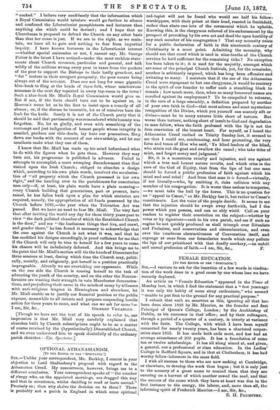OPTIONAL ATHANASIANISM.
[TO THE EDITOR OF THE "SPECTATOR."]
SIR,—Unlike your correspondent, Mr. Berkley, I concur in your objection to Lord Shaftesbury's proposal with regard to the Athanasian Creed. My concurrence, however, brings me to a different conclusion. Your correspondent speaks of "the number of clergy who, on the appointed mornings, are dragged this way and that in conscience, whilst deciding to read or leave unread." Precisely so ; then why shelve the decision on to them ? There is probably not a parish in England in which some spiritual red-tapist will not be found who would see half his fellow- worshippers, with their priest at their head, roasted in Smithfield, rather than abate one iota of the ceremonial which he upholds. Knowing this, is the clergyman relieved of his embarasment by the prospect of provoking by his own act and deed the open hostility of any such member of his congregation ? That any necessity exists for a public declaration of faith in this nineteenth century of Christianity is a moot point. Admitting the necessity, why should not that creed which is used in nine-tenths of the Church services be held sufficient for the remaining tithe ? No exception. has been taken to it ; it is used for the majority, amongst which are some of the principal Church festivals, yet, for the remainder, another is arbitrarily imposed, which has long been offensive and irritating to many. I maintain that if the use of the Athanasian Creed were repugnant to but one clergyman, it would be contrary to the spirit of our founder to suffer such a stumbling block to remain ; how much more, then, when so many honoured names are enrolled against its employment ? To be compelled to rehearse,. in the ears of a large assembly, a definition prepared by another of your own faith in God—that most solemn and most mysterious recognition of the Divine, which you yourself can scarcely sift or divine—must be to many natures little short of torture. But worse than torture, nothing short of insult to God and degradation to man follow, when the faith professed with the lip is not the firm conviction of the inmost heart. For myself, as I heard the- Athauasian Creed recited on Trinity Sunday last, it seemed to- me that I could see, condemning, and hear protesting, the very form and tones of Him who said, 'Ye blind leaders of the blind, who strain out the gnat and swallow the camel ; who take tithe of mint, and forget mercy and judgment.'
Sir, it is a monstrous cruelty and injustice, and one against whi oh a true and honest nature revolts, and which cries in the- ears of the God of Equity, that from the lips of but one man should be forced a public profession of faith against which his mind and soul rebel l And from that man it is forced—virtually, if not literally—who, by omitting it, risks collision with any member of his congregation. It is worse than useless to temporise, —we must take the bull by the horns. This is no question for- an "appeal to Ctesar," as Mr. Berlsky has it, but rather to Coma's. constituents. Let the voice of the people decide, it seems to me that the injustice should be swept away forthwith, had I the power which you possess, and can so ably wield. Call on your readers to register their conviction on the subject—whether by votes or by signature—each in his own parish, and see if such an- engine be not quickly produced as shall triumph over Ritualists, and Prelatista, and conservatism and circumlocution, and even, over the cumbrous obstructiveness of Convocation itself, and expunge at once from our formularies words which may pollute- the lips of our priesthood with that deadly mockery,—an unfelt
and unreal profession of faith.—! am, Sir, &c., F.


































 Previous page
Previous page